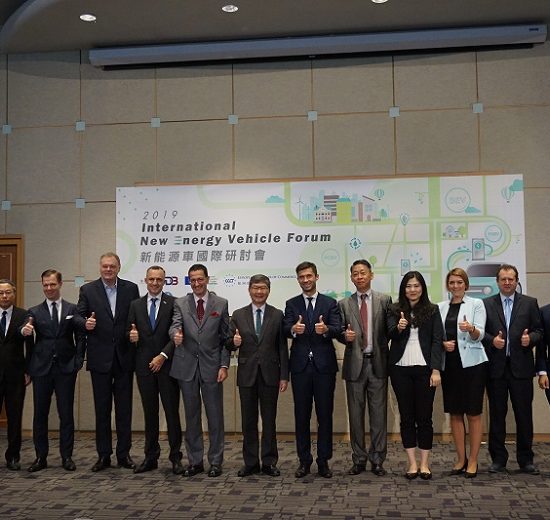2019 International New Energy Vehicle Forum
The European Chamber of Commerce Taiwan (ECCT) today hosted the 2019 International New Energy Vehicle (NEV) Forum. The purpose of the forum was to offer international insights and best practices on topics that are crucial to the future development of NEVs, namely, policies, charging infrastructure and business models. The full-day event was organized by the ECCT’s Mobility committee in collaboration with the Ministry of Economic Affairs' (MOEA) Industrial Development Bureau (IDB), the Environmental Protection Administration (EPA), the Ministry of Transportation and Communication (MOTC) and the European Economic and Trade Office (EETO). At the event, opening remarks were made by MOTC Deputy Minister Huang,Yu-Lin, EPA Deputy Minister Shen Chih-Hsiu, IDB Secretary General Chen Pei-Li, EETO Head of Office Filip Grzegorzewski and ECCT Vice Chairman Henry Chang. This was followed by three sessions, featuring prominent speakers from European and Taiwan government and industry. Each session was concluded with a panel discussion in which all speakers from the session participated.
The morning session focused on the topic “Policies, successful cases and challenges” while the two afternoon sessions focused on “Charging infrastructure and business models”. Prominent speakers from Europe were Ivone Kaizeler, Team Leader, Competitiveness and International matters, European Commission DG GROW; Petr Dolejsi, Director, Mobility and Sustainable Transport, European Automobile Manufacture’s Association (ACEA) and Christina Bu, General Secretary of the Norwegian Electric Vehicle Association. Prominent speakers from Taiwan included Leu Jang-hwa, Director General, Industrial Development Bureau, MOEA; Tsai Meng-yu, Director, Department of Air Quality Protection & Noise Control, EPA and Huang Hsin-hsun, Deputy Director General of the Institute of Transportation (IOT), MOTC.
The forum was arranged in order to encourage exchanges, discussions, and cooperation between government agencies and industry players in an attempt to identify feasible solutions to make Taiwan's path to vehicle electrification a smooth one. In particular, one of the main aims of the forum was to promote and synchronise awareness and understanding among Taiwan's government agencies and industry players of crucial elements that should be considered during the process of devising NEV development policies, identify action lists for authorities and industries to work on through parallel meetings following discussions at the forum and serve as the beginning of an integrated EU-Taiwan platform on NEV initiatives, which will be followed up with continuous discussions and updates on NEV developments in Europe.
The forum comes at a time when the global market for vehicle electrification is expanding rapidly. In 2018, more than 1.7 million plug-in and battery electric vehicles were sold worldwide, a nearly 40% increase over 2017. According to McKinsey, the global production of battery electric vehicles is estimated to reach 3.5 million in 2020 and 14.8 million by 2025. Electrification is also considered the prerequisite for other major automotive trends, such as autonomous driving and connected vehicles. Major global automakers have announced aggressive plans for launching electric vehicles by 2022.
The shift away from internal combustion engines to electric vehicles will have significant consequences for both the automotive assembly and parts manufacturing industries. The trend will disrupt not only existing industries, but also regulatory supervision, infrastructure, energy supply, service providers and consumer behaviour, among others.

